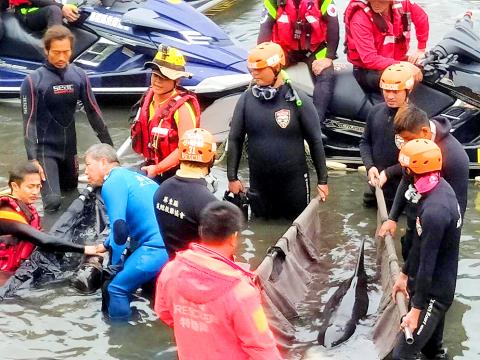Three pygmy killer whales rescued from the Port of Kaohsiung (高雄港) died on Friday night despite hours of treatment by experts, who found 18 entangled plastic bags in the stomach of one of the whales.
The three whales were part of more than 20 cetaceans disoriented in the port and reported to Kaohsiung City Government’s Agriculture Bureau on Feb. 4.
The agriculture bureau found the carcasses of a Risso’s dolphin and eight pygmy killer whales in the days following the alert.

Photo: Tsai Ching-hua, Taipei Times
After efforts to rescue three surviving whales failed on Tuesday last week, the bureau, under the advice of Wang Chien-ping (王建平), director of the Marine Biology and Cetacean Research Center at National Cheng Kung University, decided to bring them to shore to save them from dying in the cold weather, it said.
More than 60 people joined the effort to catch them on Friday, including workers from Taiwan International Ports Corp; shipbuilder CSBC Corp, Taiwan; China Steel Corp; the Forestry Bureau; the city government’s Marine Bureau; and rescue associations in Chiayi and Pingtung counties, the agriculture bureau said.
After more than three hours, they managed to bring the three whales to shore and sent them to the university’s research center for medical care.
Despite hours of treatment, the whales lost their lives on Friday night, Wang said yesterday, adding that their cardiopulmonary functions were weak before they died.
Unidentifiable garbage and plastic bags were found in the whales’ stomachs when the center dissected the bodies.
A bundle of “black stuff” was dragged from the stomach of the thinnest whale — the mass turned out to be 18 entangled plastic bags.
“The whale’s stomach was stuffed with bags. It could not take in any more, although it must have been very hungry,” Wang said, while calling on the public to reduce plastic bag use and stop dumping garbage in nature.
Many netizens found the news heart-wrenching, with some saying: “Humans should apologize to you!”
Why the creatures became disoriented is uncertain, the agriculture bureau said, adding that if people find any whales or dolphins disoriented or grounded along the shore, they should immediately report it to the city government using the 1999 hotline.

The Ministry of Economic Affairs has fined Taobao NT$1.2 million (US$36,912) for advertisements that exceed its approved business scope, requiring the Chinese e-commerce platform to make corrections in the first half of this year or its license may be revoked. Lawmakers have called for stricter enforcement of Chinese e-commerce platforms and measures to prevent China from laundering its goods through Taiwan in response to US President Donald Trump’s heavy tariffs on China. The Legislative Yuan’s Finance Committee met today to discuss policies to prevent China from dumping goods in Taiwan, inviting government agencies to report. Democratic Progressive Party Legislator Kuo Kuo-wen (郭國文) said

The Ministry of Economic Affairs has fined Taobao NT$1.2 million (US$36,900) for advertisements that exceeded its approved business scope and ordered the Chinese e-commerce platform to make corrections in the first half of this year or its license would be revoked. Lawmakers have called for stricter supervision of Chinese e-commerce platforms and more stringent measures to prevent China from laundering its goods through Taiwan as US President Donald Trump’s administration cracks down on origin laundering. The legislature’s Finance Committee yesterday met to discuss policies to prevent China from dumping goods in Taiwan, inviting government agencies to report on the matter. Democratic Progressive Party

Taiwan and its Pacific ally Tuvalu on Tuesday signed two accords aimed at facilitating bilateral cooperation on labor affairs, according to Taiwan’s Ministry of Foreign Affairs (MOFA). The governments inked two agreements in Taipei, witnessed by Foreign Minister Lin Chia-lung (林佳龍) and visiting Deputy Tuvaluan Prime Minister Panapasi Nelesone, MOFA said in a news release. According to MOFA, the agreements will facilitate cooperation on labor issues and allow the two sides to mutually recognize seafarers’ certificates and related training. Taiwan would also continue to collaborate with Tuvalu across various fields to promote economic prosperity as well as the well-being of their

Sung Chien-liang (宋建樑), who led efforts to recall Democratic Progressive Party (DPP) Legislator Lee Kun-cheng (李坤城), was released on bail of NT$80,000 today amid outcry over his decision to wear a Nazi armband to questioning the night before. Sung arrived at the New Taipei District Prosecutors’ Office for questioning in a recall petition forgery case last night wearing a red armband bearing a swastika, carrying a copy of Adolf Hitler’s Mein Kampf and giving a Nazi salute. Sung left the building at 1:15am without the armband and covering the book with his coat. Lee said today that this is a serious